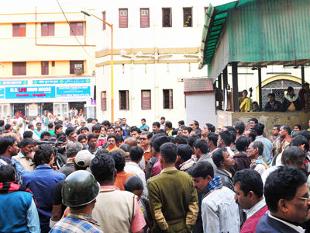 Kolkata, Jan 2: Gang-raped twice and dumped in a government hospital for nine days with fatal burns, the 16-year-old victim had no peace even after death. Police hijacked the hearse carrying her body on Tuesday night and forcibly took it for cremation, ignoring the family's requests to wait till Wednesday.
Kolkata, Jan 2: Gang-raped twice and dumped in a government hospital for nine days with fatal burns, the 16-year-old victim had no peace even after death. Police hijacked the hearse carrying her body on Tuesday night and forcibly took it for cremation, ignoring the family's requests to wait till Wednesday.
The girl's father rushed to governor M K Narayanan to complain against police high-handedness and demanded action against the "tyrannical" officers.
Police were in such a hurry to cremate her before daybreak that they landed up at the house of the bereaved family - with the body - at 2.30am and threatened to break down their door unless they were given the death certificate that would allow cremation. When the girl's father refused, police officers allegedly told him to go back to Bihar's Samastipur. A police team tormented the family all night.
The unexplained haste and utter disregard for family sentiments by the administration triggered widespread protests in the city. Filmmaker Aparna Sen lent weight to the outcry, saying: "I am devastated. All this should stop." All that the family wanted was to wait for a day for their relatives to come from Bihar. But that was not to be. Around 10.30pm on Tuesday, police intercepted the hearse that was carrying the body from RG Kar Hospital to a mortuary and forcibly took it to the crematorium although they did not have the death certificate, said a relative of the victim. "Sensing something wrong, I jumped off the hearse," he said.
The body lay at the crematorium for over three hours until, around 2pm, police decided to get the certificate from her family. The girl's father narrated in his letter to the governor what happened next. "The superintendent of police and other officers reached our house in the dead of the night and asked us to open the door. We were scared and refused to come out before day broke. They threatened to break down the door and told us to go back to Bihar."
While police were pressuring the family, a stranger - possibly a police plant - appeared on the scene with a poster that said "I Condemn". He tried to pacify the crowd but failed. Then, a self-proclaimed rights activist, Rakesh Upadhyaya, raised a ruckus. "The pressure on us got worse. Protectors had turned tormentors. But I stuck to my stand and refused to come out," the victim's father said. By then, Left activists had started arriving at the house.
Taking a leaf out of Mamata's book as Opposition leader, CPM's labour arm Citu took control of the body on Wednesday, but with the sanction of the family members. Sensing the damage they had done, police backed off and allowed the body to be taken to the Citu state headquarters. CPM supporters took out a huge rally with the body on Wednesday afternoon. The girl's father, who had gone to meet the governor, joined the rally around 3pm and agreed to the cremation only after getting an assurance of protection from Narayanan.
The victim's brother-in-law had no regret that the body lay at the Citu HQ all day long. "CPM was with us when we were camping in the hospital for the last nine days. They helped us. If you call this politics, so be it," he said.
Trinamool leader Mukul Roy reacted by saying: "The incident is unfortunate. The rest is an attempt by the Opposition to denigrate Trinamool and the government." He had no comment on the police haste to cremate the body on Tuesday night.
Police could not give a clear explanation for the night-long drama. "We wanted to ensure that there is no law-and-order problem," said joint commissioner (HQ) Rajeev Mishra. But sources close to the development said police acted under the directions of a Trinamool minister from North 24-Parganas who wanted police to prevent the incident from spilling over into January 1 when Trinamool celebrates its foundation day. "Calls to home secretary Basudeb Banerjee on the police high-handedness on Tuesday night fell on deaf ears," said Leader of the Opposition Surjya Kanta Mishra.
NCW questions Kolkata police's role in rape case
National Commission for Women (NCW) chairperson Mamta Sharma on Wednesday questioned the role of Kolkata Police in the gang rape leading to the death of a minor girl and said had the police been alert, they could have prevented the gang rape a second time.
"The girl was gang-raped once before going to the police station, and while returning, she was gang raped again. I don't think the role of police is right in this case. If the police had been alert, then they could have prevented her from being raped again. The chief minister should take up this case very seriously," said Sharma.
The NCW took suo motu cognizance case. "I am going to write a letter to the CM to answer us in a week why such crimes are happening against women, and what action has been taken in these cases," said Sharma.
She also said the victim was traumatized, and had she been given proper guidance and medical treatment, she wouldn't have committed suicide.
"We are thinking of sending a committee there to analyze the situation," she added.





Comments
Add new comment